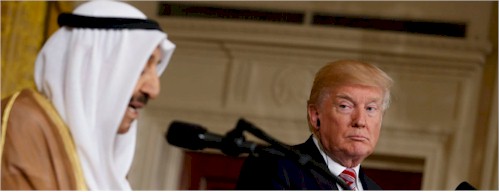
President Trump has a powerful weapon to attack foreign individuals who engage in corruption and commit serious human rights abuses. The Global Magnitsky Act provides for imposing sanctions, such as freezing assets and banning visas, on corrupt foreign actors and their enablers. Over 100 individuals and entities have been so listed by the U.S. since its passage in 2012. Kuwaitis who illegally framed and jailed a prominent business woman, Marsha Lazareva, in an attempt to abscond with almost a half billion dollars of her funds and knock a competitor out of business should be next.
Marsha, a former U.S. green-card holder whose five-year-old son is an American citizen, was convicted in a Kuwaiti court based on documents now known to be forged. The original criminal complaint was filed, as is permitted under Kuwait law, by an individual with ties to a competitor. During her “trial,” Marsha was not allowed to present a defense. The Kuwaiti judge sentenced her to 10 years of hard labor.
Marsha headed a private-equity group, KGL Investment. As a Christian woman of East European descent, she was a rarity in a male culture and a Gulf economy dominated by locals tied to the royal family.
She earned the half billion dollars for her investors by successfully completing a real estate deal in the Philippines, but the Kuwaiti government directed the UAE to freeze the funds after they were transferred to her business account in a Dubai bank. Then Kuwaiti officials accused her of “stealing” the funds because she had not repaid the investors.
When the illegal freezing finally came to the attention of some honest Kuwaiti officials, they worked with the UAE to release the funds. But Marsha still languishes in an overcrowded jail while corrupt officials, in an effort to keep her locked up, continue to malign her on social media, a crucial source of information in Kuwait. Thus, the human rights abuse continues.
Intimidating foreign business leaders is not uncommon in authoritarian states. Last year, China arrested two Canadian businessmen for specious national security crimes in retaliation for Canada’s retention (at the request of the U.S.) of Meng Wanzhou, the CFO of Huawei. Two years earlier, Beijing jailed three Australian resort executives for promoting gambling. In 2016, the UAE arrested and tortured four American, Canadian, and Libyan businessmen, forcing them to confess (falsely) to funding terrorism. Not only are business persons working in certain countries at substantial risk, but the countries’ conduct corrupts markets. Why do they do it? Because they can. It is time there are consequences.
Kuwait has much to lose if President Trump imposes Magnitsky sanctions. Last year, the Financial Times Stock Exchange (FTSE) index upgraded it from a “frontier” to an “emerging” market. The Morgan Stanley Capital International (MSCI) index, which is used to measure equity market performance in global emerging markets, is considering a similar upgrade in 2019, a decision that should translate into billions of dollars of foreign investment for Kuwait. But not if the MSCI learns of Marsha’s story.
World-wide public exposure of Kuwait’s corruption and fraudulent imprisonment of foreign investors via application of the Magnitsky Act would not bode well for Kuwait’s financial future.
Victoria Toensing (@VicToensing) is a founding partner of Washington, D.C. law firm diGenova & Toensing, LLP, which represents Ms. Lazareva. She formerly served as deputy assistant attorney general at the U.S. Department of Justice and as chief counsel for the Senate Select Committee on Intelligence.

